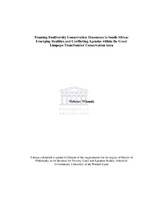| dc.contributor.advisor | Matose, Frank | |
| dc.contributor.advisor | Bollig, Michael | |
| dc.contributor.author | Whande, Webster | |
| dc.contributor.other | School of Government | |
| dc.contributor.other | Faculty of Economics and Management Sciences | |
| dc.date.accessioned | 2014-01-31T13:10:48Z | |
| dc.date.available | 2010/08/04 23:02 | |
| dc.date.available | 2010/08/04 | |
| dc.date.available | 2014-01-31T13:10:48Z | |
| dc.date.issued | 2009 | |
| dc.identifier.uri | http://hdl.handle.net/11394/2676 | |
| dc.description | Philosophiae Doctor - PhD | en_US |
| dc.description.abstract | This dissertation explores local people's framing of externally driven biodiversity conservation approaches in the context of transfrontier conservation initiatives. It uses data from the Madimbo corridor, a specific locality within the Great Limpopo Transfrontier Conservation Area, situated to the northeast of South Africa along the South Africa-Zimbabwe boundary. It shows that livelihoods, historical experiences with external interventions and exclusion from policy-making processes and programme implementation influence local strategies for engaging with external interventions. Thus, an analysis of framing of external interventions at a local level should establish the following: the role of natural resources in sustaining local livelihoods; local historical experiences with an external intervention; iii) the nature of multi-level actor interactions from local resource dependent people, to national, regional and global actors involved in or affected by an intervention. The study uses a detailed case study of Bennde Mutale village to trace local people's ideas, ways of speaking and actions in response to the implementation of a large-scale transfrontier conservation initiative. The study finds that local livelihoods play a central role in local responses to the changes that transfrontier conservation bring upon people's lives. Many see further exclusion, while some also see and hope for a restoration of the socio-cultural border region. The globally significant biodiversity - to be conserved for 'future generations' - at the same time constitutes the natural resources that sustain local people's livelihoods. Further, local livelihoods are more diverse than is commonly acknowledged in literature advocating for transfrontier conservation. This lack of acknowledgement of local diversification contributes to the main observation made in this study: that current processes of transfrontier conservation end up replicating and re-inventing the multiple forms of exclusion that have characterised state conservation practices for over a century. While transfrontier conservation enables the freer movement of wildlife, it in fact further constrains the movements of people whose mobility within less closely controlled border regions remains centrally important to survival. At the same time, state actors come into the area with contradicting and conflicting demands ranging from the beneficial advocacy role for land rights to the enforcement of conservation through fences and game rangers, experienced as a direct infringement on livelihood possibilities. The study concludes that there is a need to rethink transfrontier conservation interventions. The diversity of local livelihood approaches needs to be considered more centrally and clearer understanding needs to be developed of how the promises of opportunities, betterment of lives and increased human mobility actually unfold in practice. In order to succeed and deliver on site - not only to high-class tourists seeking to view unique biodiversity but to local people - transfrontier conservation efforts need to engage multiple actors directly from the ground up and throughout the process of policy-making, programme conceptualisation and implementation. | en_US |
| dc.language.iso | en | en_US |
| dc.publisher | University of the Western Cape | en_US |
| dc.subject | Framing biodiversity conservation discourses | en_US |
| dc.subject | South Africa | en_US |
| dc.subject | Understanding TFCAs | en_US |
| dc.subject | Conservation policy | en_US |
| dc.subject | Practice and dynamics along the Madimbo corridor | en_US |
| dc.subject | Great Limpopo Transfrontier Park | en_US |
| dc.title | Framing biodiversity conservation discourses in South Africa: emerging realities and conflicting agendas within the Great Limpopo transfrontier conservation area | en_US |
| dc.type | Thesis | en_US |
| dc.rights.holder | University of the Western Cape | en_US |
| dc.description.country | South Africa | |

